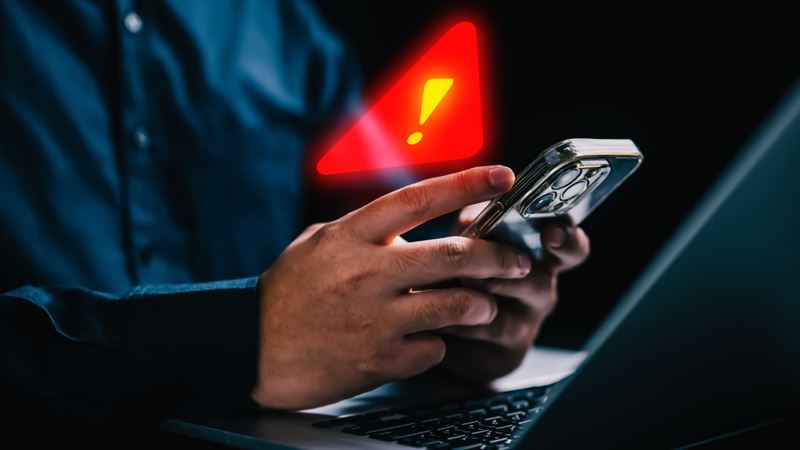

It’s easy to think that scams always ‘happen to someone else’, that it’s just the vulnerable or those that aren’t paying attention who fall victim to such things.
However, according to research from Age UK, four over 50s are the victim of fraud every minute, leaving millions fearful of attacks.
Sadly, the perceived stigma of ‘falling for’ a scam means that only a small percentage are reported (even though fraud is the most common crime in the UK), making it harder for the authorities to catch the criminals behind them.
“Frauds and scams are the only sort of crimes we’d say you’d ‘fall for’. That’s quite shaming,” says Paul Maskall, UK Finance’s Fraud and Cybercrime Lead.
“But I wouldn’t turn round and say: ‘I can’t believe you fell for that burglary.’ A criminal has targeted you to manipulate and steal something.”
We’ve been speaking to several experts and researching the biggest scams (especially those that often target the over 50s) to find the common red flags that you can learn to spot.
With a little understanding of the warning signs, you can help minimise your chances of being affected by fraudulent schemes.
The expert sources have also shared their tips to help you stay safe and more easily spot attempted fraud, whether you’re checking your emails, scrolling through social media, picking up the phone or answering the door.

These scams are run using QR (quick response) codes, which are little black and white grids of pixels that look a touch like barcodes.
Scanning these with a smartphone camera should take you through to a legitimate payment website – but identical-looking stickers are being placed over the genuine QR code, redirecting you to more nefarious destinations online.
Drivers being caught by this scam will click on bogus links to fake websites – run by fraudsters, they’ll request your card details to make a payment and then use them to spend money from your account.
Senior consumer expert at Citizens Advice, Kate Hobson, told Saga Money that the easiest thing motorists can do is to check the code itself: has it been tampered with? Does it look like it’s been stuck over another one?
“If you do scan the code and provide the information asked for, you’re at risk of handing over personal details, losing money and, as you won’t have paid the real company, you even could end up being hit with a parking ticket too,” she adds.
“Or you may have downloaded malware that scammers can use to steal your personal information.”

One of the more sophisticated scams is known as ‘skimming.’ This involves a scammer fitting a specialist device in the ATM, which records the details from the magnetic strip of your card, while a hidden camera, installed above the keypad, captures your Personal Identification Number (pin) as you enter it.
Once the thieves have this information, they’re able to load your stolen data onto a new card and start spending your money.
Another, less sophisticated, type of ATM fraud is known as ‘card trapping’. Here, a device is fitted to the slot that prevents your card being returned to you.
Again, a hidden camera will likely record your pin as you enter it. After you’ve walked away in frustration, the fraudster returns to the ATM, removes the device and steals your card with your details recorded.
Alternatively, fraudsters might use fake keypads, fitted over the real one, to record your pin as you enter it. In some cases, this information is then sent to awaiting criminals over Wi-Fi.
Link’s Director of Strategy, Graham Mott, told Saga Money: “The good news is that long term, we are seeing a decline in ATM fraud cases. However, we always ask customers to remain vigilant.
“Make sure you always protect your pin, and if you ever see anyone acting suspiciously around a cash machine – or you think it’s been tampered with – please do not use it. Contact the police or Crimestoppers.”
.jpg?sc=max&mw=800&h=450&la=en&h=731&w=1300&hash=EEB6C0C40C017DB901005D03DB43F954)
Romance fraud – where someone is persuaded to give money to a person they’ve never met but believe they’re in a relationship with – has soared for those aged 55 to 64.
According to new data from Lloyds Bank, the scam is mostly perpetrated online. Victims are targeted on dating sites (and social media) and from there, fraudsters use manipulative language to trick those looking for love, before eventually convincing them to send money.
UK Finance found that, in the last year there’s been a 29% increase in people who had met someone online being asked to give or lend money without meeting them in person.
From there, half of them agreed to do so, losing £18.5m in the first six months of 2023.
Metro Bank’s Head of Fraud & Investigations, Baz Thompson, told us of one 73-year-old customer who sadly lost many thousands to a woman he’d built a relationship with over email and telephone.
“The first payment request was for a few hundred pounds – he was happy to help as she seemed in genuine need. By the time he started to get suspicious, he had made over 80 payments in less than six months and had lost nearly £57,000.”
The bank was able to help him recover £31,000, but he lost the rest.
We all want to pay our tax correctly, but this is something criminals look to exploit by sending sudden demands for payment.
An HMRC spokesperson told Saga Money: “Criminals are great pretenders. They use emails, phone calls and texts to try and dupe citizens and often mimic government messages to make them appear authentic.
“Around the end of the tax year, some people might expect to hear from HMRC and so can be tricked into sharing their details, or even money, with fraudsters.”
These criminals, looking to steal your personal details, will often require you to act within a very short period of time.
The messages may look or sound genuine, using an address that appears to be from HMRC, but don’t click on any attachments or links. These may take you to a fake website that steals your details or infects your tech with damaging malware.

Pension scams are often highly sophisticated, complex...and can be truly devastating. Scammers may try and tell you that they can help you access your pension before the age of 55, often in the form of a ‘loan’ or other way to get the cash out, without mentioning it could come with a hefty tax bill.
You could also be approached out of the blue with the offer of a ‘free’ pension review. Should you accept this, you may be encouraged to transfer your pension into a higher-risk scheme, investing in things like overseas property, bio-fuels, storage units – even care homes – for high, or ‘guaranteed’, returns.
However, if you’re caught in one of these schemes, you could be hit with a huge tax bill or have your funds stolen or lost in worthless investments.
“If you fall victim to scams, you can lose a lifetime’s savings in a couple of seconds. We’ve seen scammers clone websites of reputable firms and if you don’t do your homework, and check if they’re legitimate, you could end up losing money,” Mike Broomfield, Head of Intelligence at The Pensions Regulator, told us.
“Scammers are shapeshifters, they’re smart and they’re always one step ahead.”
.jpg?sc=max&mw=800&h=450&la=en&h=731&w=1300&hash=E34E0B60650327DA6F961C4E965DD120)
However confident you might feel using WhatsApp, it’s a popular way for fraudsters to find victims – capitalising on your familiarity with the messaging service and hoping to catch you off guard.
Scams are varied, but almost all will be attempting to get money paid to a fraudster, steal your details or even take over your account (and lock you out).
These attempts can be from a loved one messaging from a ‘new’ number, a hacked friend asking for a code (to steal your account details) or even a stranger pretending to know you.
“If a message is unexpected, if it makes you feel something – like sympathy for someone or that you’re missing out on something, and if it asks you to do something – like click on a link, provide personal information [or pay money], these are the big red flags,” Dr Jessica Barker, CEO of cybersecurity firm Cygenta, told Saga Money.
In 2023 there were 6,640 reports of holiday fraud (where you pay for a getaway, only to find that some or all of it is fake), costing holidaymakers a combined £12.3 million.
These could be presented in the shape of bargain holiday packages, time-limited discounts, or last-minute availability in an otherwise fully-booked hotel or resort. You could also book through a website you think is legitimate, only to find it’s been cloned and is actually set up to steal your details.
Alternatively, scammers can pose as travel agents and let you book a villa or airline tickets, but the money is taken and your tickets or booking confirmation never turn up.
“Scammers are always looking to tap into people's emotions to make their schemes more plausible and likely to work,” says Jenny Radcliffe, Director of Social Engineering at Human Factor Security.
“Holidays, whether bookings or searches, are a rich target area in this regard as people are looking for good deals, but are unfamiliar with what might be ‘normal’ for different locations, events and activities.”
While most people know to guard their bank details, they’re less protective over gift cards, which makes them an easy target for fraudsters.
You might get a message from someone you know over text or social media, telling you they’re using a ‘new’ number because of an issue with their phone.
They’ll need you to purchase a gift card urgently and send them the codes, before emptying them of funds instantly.
Another version is through ‘advance fee scams’, where you must pay upfront to ‘unlock’ a gain or reward – a gift card often being the way you’ll be required to send the funds.
“You might have ‘won’ a prize or a lottery and the scammers will say you need to authenticate this, so go and buy a certain amount of gift cards and then give us the codes to unlock your prize,” says Paul Maskall from UK Finance.
“So, you get people turning up to retail establishments buying boatloads of gift cards in order to ‘verify’ themselves.”

Scammers are using bogus life-insurance claims and offers to gain access to your details or steal your cash.
They may say they can lower your premiums, or that your policy needs to be reviewed for an official-sounding reason.
Bereavements are, sadly, also a time when scammers are likely to attack, tricking people into paying a fee or handing over their personal details by saying they may be due a large payout from the recently-deceased's life insurance.
Paula Llewellyn, Chief Marketing Officer and Direct MD at Legal & General Retail, says: “A suspicious scam email will sometimes – though not always – have spelling mistakes and may ask you to click on a link and enter your bank details, which should definitely be avoided.”
Citizens Advice helpline: 0808 223 1133
Report a scam and get help and support
Action Fraud: 0300 123 2040
The police line for reporting fraud or cybercrime
Victim Support: 0808 16 89111
Free, confidential help if you’ve been affected by a scam

There’s billions sitting unclaimed in shares and dividends – find out if any belongs to you.

From their first savings account to their first home, find out how your gifts can make the biggest impact for your grandchildren
.jpg?la=en&h=354&w=616&hash=653168623B92F3457D40ACA115D37B3E)

.jpg?la=en&h=354&w=616&hash=458B0288E9852F4B63A433E2FDD375E7)



We're here to help you make the most with your money. With a rage of financial services designed with over 50s in mind.